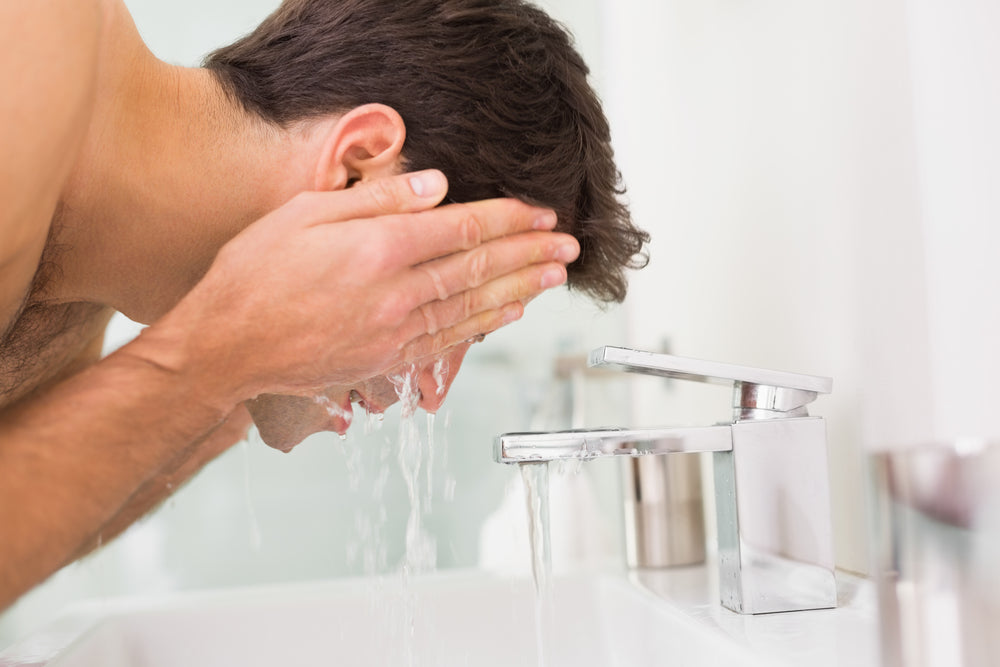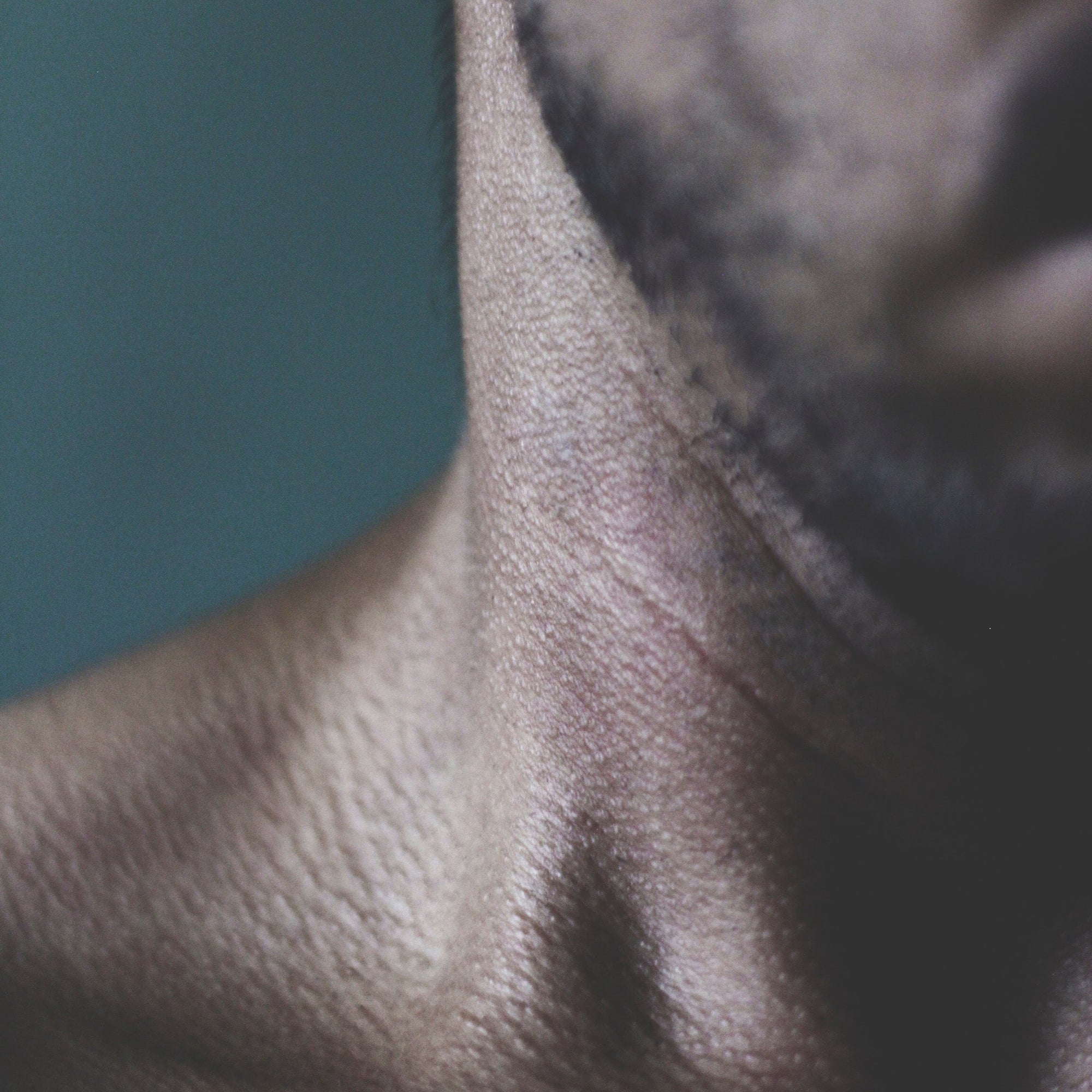Exfoliating away dry, dead skin cells is one of the most beneficial things you can do for your skin.
But when your skin is sensitive it can also be one of the most irritating!
The solution is to take a very gentle approach.
Below we set out the benefits of exfoliation for your sensitive skin, along with a plan for the right way to exfoliate without irritation.
The result will be perfectly clear, smooth, healthy looking skin.
Gently does it!
 Gently clear away dry, flaky skin cells
Gently clear away dry, flaky skin cells
Clear, healthy skin - no irritation
If your skin tends to become quite red and irritated during the day, chances are you have sensitive skin.
Redness, itching, and dry, flaky skin are all classic (and irritating) signs.
And it’s even worse when you shave! If you have sensitive skin your more prone to razor burn, irritation and ingrown hairs.
It’s not always easy to know the causes of your sensitive skin, but you can certainly develop a smart approach to dealing with it.
What are the benefits of exfoliation for sensitive skin?
Exfoliation is the one step in any skincare routine that will really make your complexion healthy, and help to keep your skin younger looking.
It eliminates the dry, flaky skin cells, accelerates cell renewal and stimulates your skin’s natural repair mechanism – vital if you’re suffering from redness and irritation.
Exfoliating results in an instant improvement in the appearance of your skin
- the texture of your face looks smoother
- there’s an improvement in overall skin tone, and your pores appear smaller
- there’s less chance of ingrown hairs
- it allows for better absorption of your moisturizer, keeping your skin well hydrated
It also increases circulation to your face, bringing nutrients to the skin’s surface. This in turn leads to a healthier complexion.
And exfoliating is especially important for men
It’s the build-up of dead skin cells that can lead to annoying razor bumps and ingrown hairs when you shave. Exfoliating the dead cells away stops ingrown hairs from forming and goes a long way to improving the overall texture of your face.
We’ve got more here on the best way to shave sensitive skin: “How to Prevent Razor Burn, Even If You Have Sensitive Skin"
And if you have a beard, exfoliation will keep beard dandruff at bay, improve the texture of your skin and keep your hair follicles clear and healthy, encouraging strong beard growth.
What can I use to exfoliate my face?
Exfoliation isn’t only limited to the usual grainy facial scrubs, which can be much too harsh for your face, especially if you have sensitive skin.
Essentially there are two different types of exfoliant you can use – physical and chemical.
Physical exfoliants:
- Facial Scrubs
- Facial brushes and electronic cleaning devices
- Sponges or wash cloths
Chemical exfoliants:
- Natural substances such as Alpha Hydroxy Acids, either included in your face wash or as a separate exfoliating lotion
- Professional chemical peel

What is the best way to exfoliate sensitive skin?
When you have sensitive skin, we would always recommend a gentle, natural chemical exfoliant as the best way to go.
And here’s why…
Exfoliating Scrubs - the mechanical action of the exfoliating beads against your already sensitive epidermis can cause micro-tears, making your face and body more susceptible to environmental aggressors and irritation.
Facial brushes and electronic cleaning devices, sponges, wash cloths – These can be much too rough for sensitive skin. and there’s always the risk of spreading bacteria unless you keep them scrupulously clean.
Professional chemical peel – not for the faint hearted or the sensitive-skinned! Whilst a professional peel is undoubtedly an effective exfoliator, it is also the harshest. Always go to a trusted and certified practitioner and take extra care of your face in the sun afterwards. The risk of developing sun spots and sun damage are greatly increased after a chemical peel.
Natural chemical exfoliants - (less scary than they sound!)
A natural chemical exfoliant, and a policy of ‘little and often’ is a much kinder way to go.
Why chemical exfoliants are the best for sensitive skin
Natural chemical exfoliants are milder and they tend to exfoliate in a much more uniform way than physical scrubs.
Gently exfoliating everyday using a mild Alpha-Hydroxy Acid (AHA), like Glycolic Acid or Lactic Acid, is the best option for your sensitive face.
These can be found incorporated in a face wash, or as a separate exfoliating lotion.
On top of that, Alpha Hydroxy Acids also act as antioxidants, which stimulate the skin’s natural repair mechanisms and collagen production, as well as gently removing dead skin cells.
We advocate gently exfoliating everyday using our Daily Face Wash which contains a mild AHA, Lactic Acid.
Customer tip: Apply a pea-sized amount of Daily Face Wash to your dry face just before stepping into the shower. Leave it to work for a few minutes, then lather and rinse.
And what works best for your face applies in the same way to the rest of your body. Whether you're exfoliating your chest, your legs or your back it’s always best to use a gentle natural chemical exfoliant – especially when you have sensitive skin.
Gently Exfoliating Face Wash for Sensitive Skin
Our Daily Face Wash is a non-drying face wash and is made with gentle ingredients that won’t irritate your face.
Natural soothing ingredients like Aloe Vera and Allantoin work to calm your skin, and Glycerin hydrates to make sure that your skin is not stripped of its natural moisture.
And like all of our products, Daily Face Wash is dermatologist tested, hypoallergenic and non-irritating.
All of our products have undergone and passed the rigorous European Cosmetic Regulations.
Plus they’re cruelty free.
So to sum up…
ACTION PLAN: How to exfoliate sensitive skin
Gently exfoliating away dead, flaky skin cells will instantly reveal brand-new, smooth, clear skin.
But the key word is ‘gently’…
Avoid using a facial scrub to exfoliate your face! They are too harsh for facial skin (especially sensitive skin) damaging the surface and causing your skin to become even more dry and irritated.
A gentle ‘chemical’ exfoliant, and a policy of ‘little and often’ is a much kinder way to go.
You need a good quality, non-drying face wash that includes a gently exfoliating Alpha-Hydroxy Acid (an AHA).
They exfoliate in a much more uniform way.
Alpha Hydroxy Acids also act as antioxidants, which stimulate the skin’s natural repair mechanisms and collagen production, helping to keep your protective lipid barrier strong.
The best solution: Gently exfoliating everyday with our Daily Face Wash is the best option for sensitive skins.
It contains the very mild Alpha-Hydroxy Acid, Lactic Acid, along with hydrating Glycerin and soothing Aloe Vera.
It’s gentle enough to use twice a day without leaving your skin feeling tight.
OTIS Daily Face Wash does double duty - cleaning and exfoliating in one simple step - but without any irritation at all.
FAQ’s
When should I see a dermatologist about my sensitive skin?
Anybody can have a one-off reaction to certain irritants, but if your skin often shows signs of redness and irritation, it could also be an indication that you have an underlying skin condition, such as:
- Eczema – dry, inflamed, itchy skin
- Rosacea – red skin, with swelling and noticeable blood vessels
- Psoriasis – rashes with patches of scaly, dry skin
In which case it’s best to seek advice from a dermatologist. They can diagnose and treat the condition effectively. Or reassure you and look for potential allergens which are causing the irritation so that you can avoid them.
On the other hand, you may just have skin that has a heightened sensitivity to possible allergens.
For many men with sensitive skin there really can be no obvious skin disorder.
How often should I exfoliate sensitive skin?
If you opt for an exfoliating lotion you may need to experiment to see what your skin will tolerate without it becoming too dry.
However, if you use our exfoliating Daily Face Wash this can safely be used every day, even on sensitive skin. Hydrating Glycerin and soothing Aloe Vera stop your face from looking red, or feeling tight and dry.
We’ve got more on exfoliation here: "A Man's Guide to Exfoliation: FAQ's"
Are Otis Skincare products suitable for sensitive skin?
Yes.
All our products are dermatologist tested, hypoallergenic and non-irritating.
They have all undergone and passed the rigorous European Cosmetic Regulations.
Plus they’re all cruelty free.
The Takeaway
Gently does it!
Exfoliating away dead skin cells is one of the best things you can do for sensitive skin - you just need to take a gentle approach. 'Little and often' is the best way to go!
Our Daily Face Wash can be used twice a day, even if you have sensitive skin. It includes hydrating Glycerin and soothing Aloe Vera so it won’t leave your face feeling tight and dry, or irritated.
If you'd like more advice on taking care of sensitive skin check out "A Skincare Routine to Calm your Sensitive Skin".
SHOP THE ROUTINE.
All you need to stay looking handsome.
PRESTIGE SKINCARE FOR MEN.
MADE IN FRANCE.



